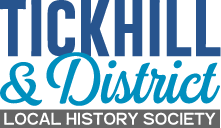

Mr G. T. Tuby, 1857-1932
Tickhill’s annual Autumn Fair was celebrated with attractions such as roundabouts and sideshows clustered near the Buttercross. Some of the attractions were provided by the Tuby family. One of the early founders of the business was Mr George Thomas Tuby who settled in Doncaster after a varied career ranging from working at Goole Docks to being a peripatetic photographer. He finally decided to follow in his father’s footsteps as a showman and acquired swings and ‘steam horses’ which were a regular fixture in Doncaster during Race Week. As well as coming to Tickhill, Mr Tuby took his equipment to Goole and Louth, for example. After only a few years as a showman he began to put some of his income to philanthropic uses. He gave money regularly to Doncaster Infirmary and various orphanages and nursing homes in places where he worked. Among those who benefited from Mr Tuby’s generosity were the inmates of Doncaster Union Workhouse. Unlike the unremitting austerity in some workhouses, Doncaster’s inmates had their lives brightened periodically with day trips to the seaside: Cleethorpes in 1892 and Skegness in 1893, all funded by Mr Tuby. On 16 July 1894 the inmates were taken to Scarborough as reported in The Doncaster Review of August 1894:
Unfortunately the weather was rather unfavourable this year, and somewhat marred the enjoyment of the recipients of Mr Tuby’s generosity, but for all that they got a considerable amount of pleasure and relaxation from the outing. Refreshments were provided by Mr Tuby at the Sandside Coffee House. The excursionists arrived safely back at Doncaster shortly after nine o’clock, and were met at the Station by an exceedingly large crowd and the Volunteer Band, which escorted the inmates back to their home ‘over the bridge.’ [The Union Workhouse was across the railway lines behind St James’s Church.] The crowd cheered Mr Tuby, followed him to his residence in the Market Place and would not let him retire until he had made a short speech.
The Review also published a letter of thanks to Mr Tuby from one of the Workhouse inmates which concluded with a poem (perhaps one of the few instances of poetry being written in a workhouse):
All hail to our good brother Tuby,
The friend of the poor and the needy;
Whose good works are known all around,
Whose praises in many towns sound.
For the good he has done, for the poor he has helped,
For the children made glad, and the sick people cheered
The blessing of God rest upon him –
The smile and the favour of Heaven;
All thanks to our good brother Tuby –
The friend of the poor and the needy.
Mr Tuby later became a councillor then, from 1913, an alderman before serving as Mayor of Doncaster in 1921. He and his wife Maria had ten children, several of whom went into the fairground business. Mr and Mrs Tuby are buried in Hyde Park Cemetery with two of their children who died in infancy. Mr Tuby was one of the first people to be featured in The Doncaster Review. The 12 page monthly paper, price one penny, was published for only four years from 1894-8 by Mr Robinson, a bookseller in Frenchgate.
If you would like to find out more about Mr Tuby and the history of fairgrounds, two websites might be of interest. The first gives access to some of the material held in the National Fairground Archive housed at the University of Sheffield, and includes, for example, some photographs of the early, highly decorated, steam-driven rides:
http://www.nfa.dept.shef.ac.uk/rides/history.html
(If you have a problem with this link, go to www.nfa.dept.shef.ac.uk and work through the links)
The second website focuses on the Tuby family’s history:
http://rogertuby.co.uk/thetubys.htm